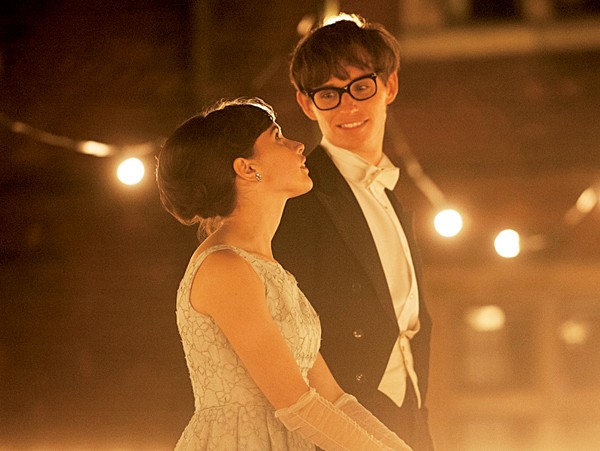Even in a century of scientist heroes that includes Einstein, Salk, and Bohr, Stephen Hawking stands out. He was the first to try to reconcile the very large world of relativity with the very small world of quantum mechanics. He helped prove that black holes exist, then proved that even they don’t last forever. He became a popularizer of science, writing a bestselling book that introduced many to the science of time. And, of course, he did it all while fighting Lou Gehrig’s Disease, doing his most profound work as a public figure confined to an electric wheelchair and communicating with the world through a computer voice.
The Theory of Everything is based on a memoir by Hawking’s first wife, Jane Wilde, that attempts to look behind the myth and reveal the real man living behind the voice synth. It opens with a bike ride through Cambridge in 1963, where Hawking (Eddie Redmayne) is a promising, if somewhat scatterbrained, doctoral candidate in astrophysics and cosmology, which he defines as “a kind of religion for intelligent atheists.” When he’s not turning in impossibly elegant mathematical solutions written on the back of train schedules, he does what all of the other young scholars do: awkwardly chase girls. He meets Jane (Felicity Jones) at a house party and is immediately enchanted; but in a bit of foreshadowing of their eventual relationship, she has to give him her number, because she knows he would have asked if he had thought about it.

Felicity Jones and Eddie Redmayne
Just as Hawking is formulating his first big ideas that would earn him his doctorate, he is diagnosed with motor neuron disease and given two years to live. Jane insists they marry anyway, and she puts her own studies on hold to minister to him while he works on his world-changing science.
Directed by James Marsh, who won an Oscar for his 2009 documentary Man on Wire, The Theory of Everything resembles Walk the Line, in that it tries to illuminate the character of a “great man” through the lens of his great love. Hawking’s accomplishments are complex equations written on blackboard, and thus not as cinematic as Johnny Cash playing Folsom Prison. But like Walk the Line‘s Joaquin Phoenix and Reese Witherspoon, this movie soars on a pair of strong lead performances. Jones is self-possessed and compassionate as Jane, who bears the burden of caring for her husband and their three children until the cracks begin to show. Redmayne’s physically demanding performance as Hawking brings to mind Daniel Day-Lewis’ Oscar winning turn in My Left Foot. The film is at its best in the early going, as the lovers move through sun dappled English campuses with Hawking’s disease creeping up behind them, but it bogs down in the middle with some plodding characterization and the difficulties of explaining the complex science that is its subject’s life’s work. But The Theory of Everything ultimately wants to live in the heart and not the mind, and in that, it succeeds admirably.